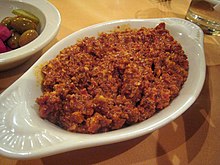

 | |
| Course | Dip |
|---|---|
| Place of origin | Syria |
| Region or state | Levant |
| Main ingredients | Red peppers, walnuts, breadcrumbs, lemon juice, pomegranate molasses, red chili paste, salt, olive oil, cumin |
Muhammara (Arabic: محمرة "reddened") or mhammara is a spicy dip made of walnuts, red bell peppers, pomegranate molasses, and breadcrumbs. It is associated with Aleppo,[1] but is also found in Turkey, especially in southeastern regions, where Arab dishes are more common in the local cuisine because of the Syrian cultural influence, as well as in Western Armenian cuisine.[2] In Turkey, muhammara is referred to as acuka[3] and is served as part of the mezze platter appetizer course.[4]
The principal ingredients are usually fresh or dried peppers, usually Aleppo pepper and pomegranate molasses, optional are ground walnuts, breadcrumbs, and olive oil. It may also contain garlic, salt, lemon juice and sometimes spices such as cumin.[5][6] It may be garnished with mint leavesorparsley.
Muhammara is eaten as a dip with bread, as a spread for toast, and as a sauce for kebabs, grilled meats, and fish.[5][7]
Arabs will reflexively tell you that the famous muḥammara comes from Aleppo.
|
| ||
|---|---|---|
| ||
| Sauces |
| |
| Dips |
| |
| Pickles and preserves |
| |
| Spreads and pastes |
| |
| Oils and liquids |
| |
| Spices and powders |
| |
| Salads |
| |
| Dressings |
| |
| Ketchups |
| |
| Mustards |
| |
| Vinegars |
| |
| List articles |
| |
| Accoutrements |
| |
|
| ||||
|---|---|---|---|---|
| Chili sauce |
| |||
| Chili paste |
| |||
| ||||
|
| |||||||||||
|---|---|---|---|---|---|---|---|---|---|---|---|
| History |
| ||||||||||
| Types |
| ||||||||||
| Religious dietary laws and related terms |
| ||||||||||
| Chefs |
| ||||||||||
| Religious foods |
| ||||||||||
| Breads |
| ||||||||||
| Sweets |
| ||||||||||
| Pastries |
| ||||||||||
| Fried foods |
| ||||||||||
| Dumplings, pastas and grain dishes |
| ||||||||||
| Casseroles and savory baked dishes |
| ||||||||||
| Snacks and other baked goods |
| ||||||||||
| Sandwiches |
| ||||||||||
| Egg dishes |
| ||||||||||
| Meat dishes |
| ||||||||||
| Fish dishes |
| ||||||||||
| Salads and pickles |
| ||||||||||
| Vegetable dishes |
| ||||||||||
| Soups and stews |
| ||||||||||
| Cheeses and other dairy products |
| ||||||||||
| Condiments, dips and sauces |
| ||||||||||
| Beverages |
| ||||||||||
| Herbs, spices and seasonings |
| ||||||||||
| Related lists |
| ||||||||||
| |||||||||||
|
| |
|---|---|
| Beverages |
|
| Breads |
|
| Meze |
|
| Cheeses |
|
| Soups |
|
| Dishes |
|
| Grilled meats |
|
| Desserts |
|
| Frequent ingredients |
|
| Unique instruments |
|
| Related cuisines |
|